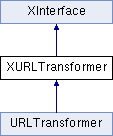supports parsing and assembling of URLs More...

Public Member Functions | |
| boolean | parseStrict ([inout] com::sun::star::util::URL aURL) |
| parses the string in URL::Complete which should contain a syntactically complete URL. | |
| boolean | parseSmart ([inout] com::sun::star::util::URL aURL, [in] string sSmartProtocol) |
| parses the string in URL::Complete, which may contain a syntactically complete URL or is specified by the provided protocol | |
| boolean | assemble ([inout] com::sun::star::util::URL aURL) |
| assembles the parts of the URL specified by aURL and stores it into URL::Complete | |
| string | getPresentation ([in] com::sun::star::util::URL aURL, [in] boolean bWithPassword) |
| returns a representation of the URL for UI purposes only | |
 Public Member Functions inherited from XInterface Public Member Functions inherited from XInterface | |
| any | queryInterface ([in] type aType) |
| queries for a new interface to an existing UNO object. | |
| void | acquire () |
| increases the reference counter by one. | |
| void | release () |
| decreases the reference counter by one. | |
Detailed Description
supports parsing and assembling of URLs
- See also
- URL
- URLTransformer
Member Function Documentation
◆ assemble()
| boolean assemble | ( | [inout] com::sun::star::util::URL | aURL | ) |
assembles the parts of the URL specified by aURL and stores it into URL::Complete
- Parameters
-
aURL the URL which contains all necessary information in a structured form. The member URL::Complete contains the URL in string notation after the operation finished successfully. Otherwise the content of URL::Complete is not defined.
- Returns
TRUEif assembling was successful orFALSEotherwise.
◆ getPresentation()
| string getPresentation | ( | [in] com::sun::star::util::URL | aURL, |
| [in] boolean | bWithPassword | ||
| ) |
returns a representation of the URL for UI purposes only
Sometimes it can be useful to show a URL on an user interface in a more "human readable" form. Such URL can't be used on any API call, but make it easier for the user to understand it.
- Parameters
-
aURL URL in structured form which should be shown at the UI bWithPassword specifies whether the password will be included in the encoding or not. Usually passwords should never be shown at the user interface.
- Returns
- a string representing the aURL if it is syntactically correct. A empty string if aURL is not syntactically correct.
◆ parseSmart()
| boolean parseSmart | ( | [inout] com::sun::star::util::URL | aURL, |
| [in] string | sSmartProtocol | ||
| ) |
parses the string in URL::Complete, which may contain a syntactically complete URL or is specified by the provided protocol
The implementation can use smart functions to correct or interpret URL::Complete if it is not a syntactically complete URL. The parts of the URL are stored in the other fields of aURL.
- Parameters
-
aURL the URL which include the string notation and will contain all parsed parts of it after finishing this call. This includes URL::Complete. sSmartProtocol optional information which protocol specification should be used to parse URL::Complete. If empty the implementation can use a protocol which fits best.
- Returns
TRUEif parsing was successful (means if URL::Complete could be syntactically correct) orFALSEotherwise.
◆ parseStrict()
| boolean parseStrict | ( | [inout] com::sun::star::util::URL | aURL | ) |
parses the string in URL::Complete which should contain a syntactically complete URL.
The implementation is allowed to correct minor failures in URL::Complete if the meaning of the URL remain unchanged. Parts of the URL are stored in the other fields of aURL.
- Parameters
-
aURL the URL which include the complete string notation and will contain all parsed parts of it after finishing this call. URL::Complete can be overwritten if the implementation corrected minor failures.
- Returns
TRUEif parsing was successful (means if given URL was syntactically correct) orFALSEotherwise.
The documentation for this interface was generated from the following file:
- com/sun/star/util/XURLTransformer.idl